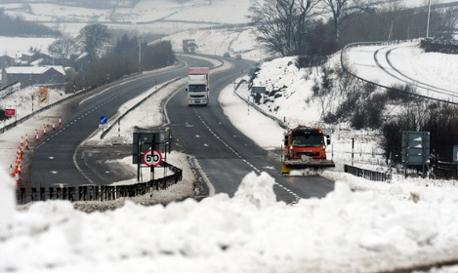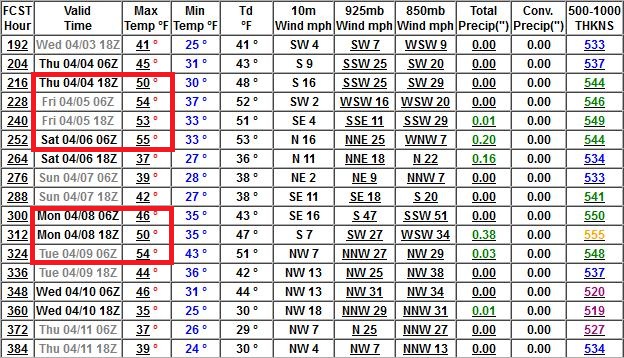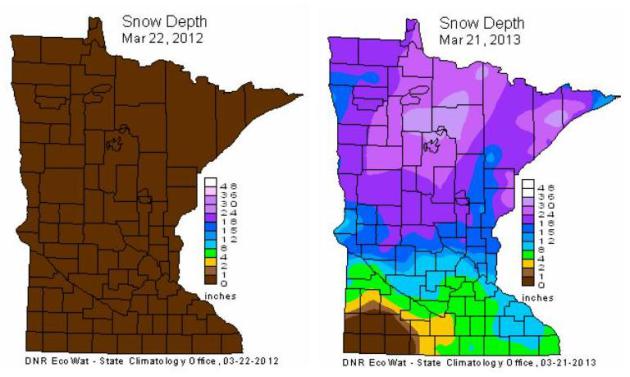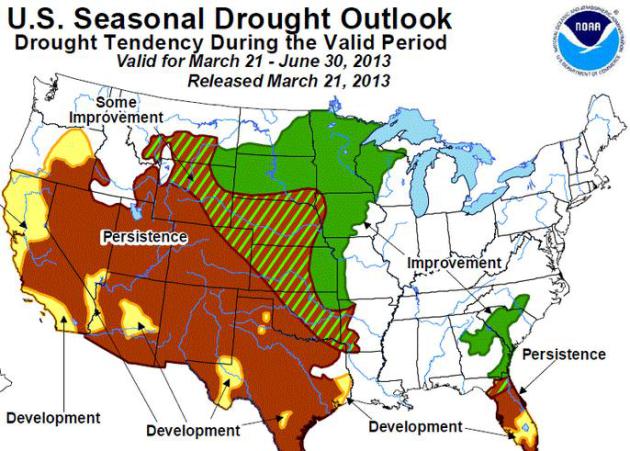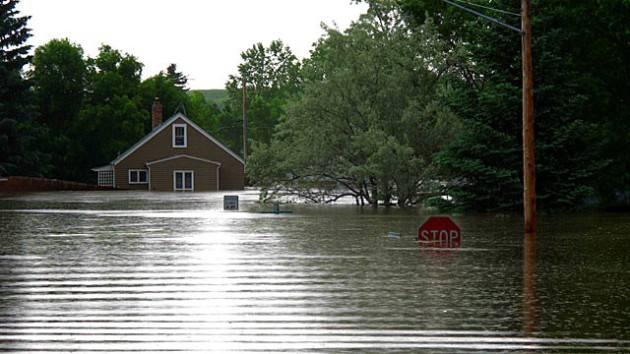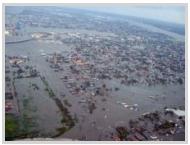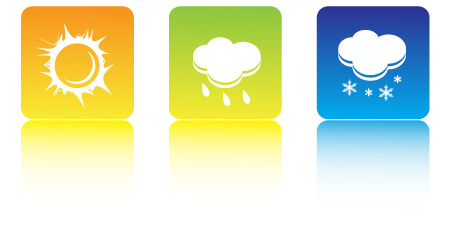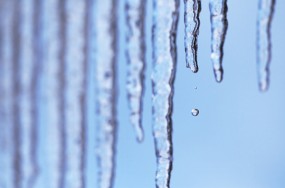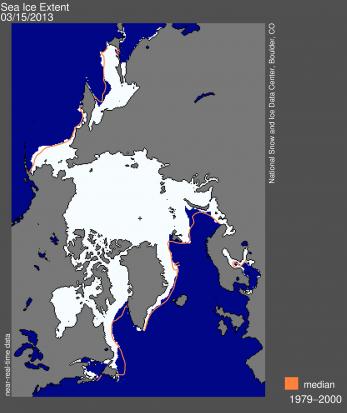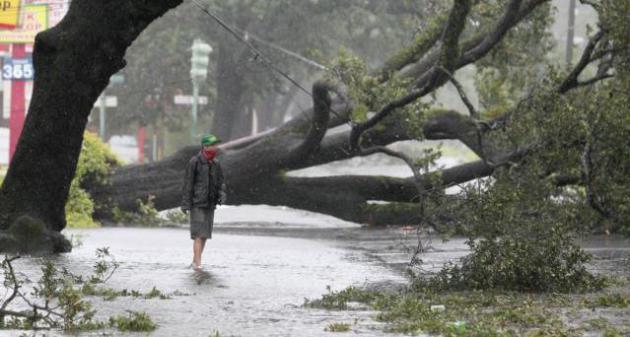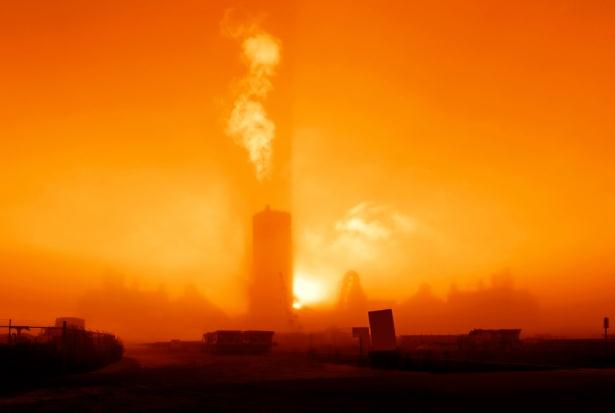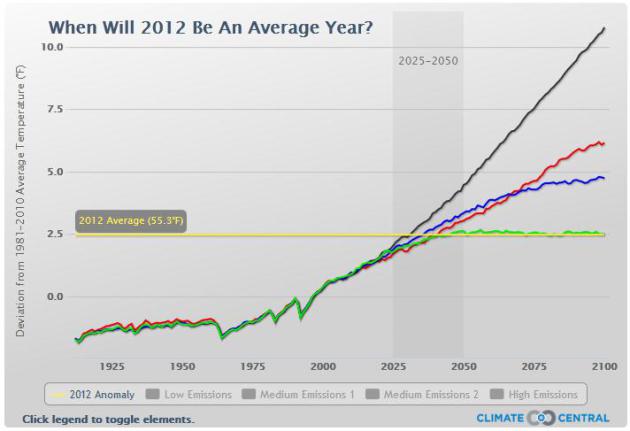Meteo-therapist
"Paul, stop me before I hurl myself into the
small glacier forming in my front yard!" If anyone asks we've gone 114
days in a row without a 50-degree high. Nearly a third of the year. Some
of us are losing our stoic sense of humor.
Yes, the groundhog lied. But how was he to know
the polar vortex would break down? High level winds at northern
latitudes have weakened dramatically, pumping warm air into eastern
Canada and Greenland. Meanwhile, a persistent dome of numbing air
centered over Hudson Bay continues to fling chilly fronts south of the
border.
The weather maps are stuck, and have been for
nearly a month. Unusual for March, when the pattern is more variable
& volatile, with frequent swings of the jet stream.
Why? Some scientists suspect record melting of
Arctic ice may be a factor. Maybe it's just cosmic payback for last
March's 70s and 80s.
Spring has been delayed, but it's still coming.
40s will feel surprisingly good later this week - a few rain showers
Saturday, but no steady or heavy rain that might spark sudden melting
and flooding.
I still believe this dramatic shift in the
weather from early 2012 bodes well for Minnesota's drought easing by
early summer. Stay tuned.
Scientists Link Frozen Spring To Dramatic Arctic Sea Ice Loss.
Following up on what I mentioned in today's column, here are more
details on how record Arctic sea ice loss last September may be
impacting prevailing winds over the Northern Hemisphere. Proving cause
and effect with the atmosphere is difficult, but there is a growing body
of evidence suggesting linkage. Here are more details from
The Guardian: "...
According to Francis and a growing body of other researchers,
the Arctic ice loss adds heat to the ocean and atmosphere which shifts
the position of the jet stream – the high-altitude river of air that
steers storm systems and governs most weather in northern hemisphere.
"This is what is affecting the jet stream and leading to the extreme
weather we are seeing in mid-latitudes," she said. "It allows the cold
air from the Arctic to plunge much further south. The pattern can be
slow to change because the [southern] wave of the jet stream is getting
bigger. It's now at a near record position, so whatever weather you
have now is going to stick around," she said..."
Photo credit above: "
Arctic ice loss adds heat to the
ocean and atmosphere which shifts the position of the jet stream, which
affects weather in the northern hemisphere." Photograph: Owen Humphreys/PA.
Touch of Spring. O.K. Daffodils won't be sprouting
in your yard anytime soon, but 50 isn't entirely out of the question by
Saturday, based on the latest ECMWF guidance (above). Highs reach 40
today, mid 40s Thursday, maybe upper 40s to near 50 Friday and Saturday,
followed by a cooling trend early next week.
Hope Springs Eternal. The GFS is fairly optimistic
that we'll see highs near 50 the first and second week of April. Big
swings in temperature, which may help to spin up a few formidable storms
in the weeks ahead. Let's hope we don't see 50s and heavy rain in the
next 2-3 weeks, or we'll be looking at river flooding, especially Red
River Valley.
No Caption Required. A friend in Atlanta passed this
on to me late last night (rubbing it in a little?) A little more than a
year ago there was no snow on the ground statewide, not even way up
north. 60s and 70s for a few weeks will do that. This year? 30" on the
ground over parts of north central and northeastern Minnesota. Maps
courtesy of the MN DNR and State Climate Office.
Cautious Optimism. The latest NOAA CPC Outlook shows
a higher probability of improvement in drought conditions from the
Dakotas and Minnesota into western Wisconsin. Even the Central Plains
may see some easing to the worst drought since the 1950s.
Manitoba Forsees Moderate To Major Flood Potential. Canada's
CBC has the story; here's a clip: "
Province
of Manitoba officials released their spring flood forecast Tuesday,
increasing their forecast to call for a moderate to major risk of
flooding along a number of provincial waterways. The forecast said there
is an increased risk of flooding along the Red, Souris, Pembina,
Saskatchewan, Qu’Appelle and Assiniboine rivers and in the Interlake
area. Provincial flood forecaster Phillip Mutulu said a heavy March
snowfall and an above-average snowpack with a high water content
contributed to the elevated risk..."
FEMA Mandatory Flood Insurance "Not Effective", Report Says.
Environmental Leader has the story; here's an excerpt: "
The
Federal Emergency Management Agency should not extend its mandatory
flood insurance program to areas without levees and needs a more modern
approach to analyzing and managing flood risk behind levees, says a
report from the National Research Council. The report says purchasing
flood insurance is an effective way for property owners behind levees
to deal with financial risk from floods. But at this time there is no
reason to extend the mandatory purchase requirement — which requires
commercial and residential property owners with a federally backed
mortgage located in the 100-year floodplain to purchase flood insurance
— to areas behind accredited levees..."
D.C. Snow No-Show A Lesson In Forecasting Uncertainty.
One note: the European (ECWMF) model did a pretty good job predicting a
lack of snow for the immediate D.C. area earlier this month, while most
U.S. models printed out a pile of snow for the nation's capital. It was
a tough forecast, and the
Herald-Review
has a good story focusing on the limits of meteorology, in spite of
supercomputers, Doppler and weather satellites. Yes, we will continue to
bust the forecast, no matter how good the technology gets: "
The
storm known to many as " Snowquester " appeared for a time like it
would be one of modern meteorology's shining moments, in which early
warnings saved the government and millions of people time, money, and
exposure to dangerous weather conditions. Instead, it turned into every
weather forecaster's worst nightmare - a bust of a forecast for a
heavily populated and politically influential region, in which the
predicted 5 to 10 inches of snow for Washington, D.C. and Baltimore
actually yielded just 0.2 inches of slop. In anticipation of the storm,
the government shut down Wednesday, keeping federal workers - well,
the ones who had not yet been furloughed by across-the-board budget
cuts known as the sequester, at least - off the roads. Schools were
closed, appointments were cancelled or rescheduled - yet all of those
disruptions, and more, turned out to be for nothing, more like a snow
drill. The failure to accurately predict the storm in the I-95 corridor
offers lessons in communicating risk and uncertainty, which can be
applied to both weather and climate forecasting..."
My Gucci Addiction. I know this is no laughing matter, but this article at
GQ did make me chuckle (a little). I feel the same about Marshall's Rack. Here's the intro: "
In
the past few years, I've bought eighty-one leather jackets. Dozens of
boots and leather gloves. I've purchased pants that cost $5,000. I own a
$22,000 coat. This winter I took a tour of Milan's Fashion Week (all
expenses paid by Gucci, in appreciation of my many, many purchases),
where I spent tens of thousands more and began to seriously grapple,
once and for all, with a compulsion that could cost me more than just
my life savings. My name is Buzz Bissinger. I am 58 years old, the
best-selling author of 'Friday Night Lights,' father of three, husband.
And I am a shopaholic..."
2,000 Years Of Partying: The Brief History And Economics Of Spring Break. Speaking of a good laugh, this article at The Atlantic is a worthy read. Here's an excerpt: "Like
Western democracy, Socratic philosophy, written histories, epic
poetry, and every other foundational pillar of high culture, spring
break began in ancient Greece. Called "Anthestreria" by the local
teens, and their parents, it was a festival dedicated to Dionysus, the
god of wine and whoopee and just about every excuse to party. For three
days, people would dance, singers would perform, women would deck
themselves with flowers, and Greek men would compete to see who could be
the fastest to drain a cup of red wine. Two thousand years later,
practically nothing has changed except our taste in chugging alcohol..." (Photo: Reuters).
Climate Stories....
Maximum Arctic Sea Ice Reached: 6th Lowest On Record.
The National Snow and Ice Data Center has more details: "
On
March 15, 2013, Arctic sea ice extent appears to have reached its
annual maximum extent, marking the beginning of the sea ice melt season.
This year’s maximum extent was the sixth lowest in the satellite
record. NSIDC will release a detailed analysis of the 2012 to 2013
winter sea ice conditions in early April..."
Scientists Predict Increasing Storm Intensity.
Voice of America has the story; here's the intro: "
If
history is any guide, a new study predicts the intensity of hurricanes
along the southeastern coast of the United States may increase because
of rising global temperatures. Climatologists also expect that storm
activity in the western Pacific will be greatly affected by global
warming during this century. Analyzing data from 1923 to the present,
the statistical model by an international team of researchers predicts
there may be a dramatic rise - anywhere from a two- to seven-fold
increase - in the number of Katrina-magnitude hurricanes along the
Atlantic coast of the United States. Katrina, a Category 5 storm,
devastated New Orleans, Louisiana, in August of 2005. The study was
published in Proceedings of the National Academy of Sciences..."
Photo credit above: "
A man
stands in front of an uprooted oak tree on Louisiana Avenue as
Hurricane Isaac makes land fall in New Orleans, Louisiana, August 29,
2012." Courtesy: Reuters.
Real Pragmatism For Real Climate Change: Interview With Dr. John Abraham. Here is a snippet of an interview with St. Thomas University climate scientist John Abraham at
oilprice.com:
"
First, the main message is:
1. Humans are causing climate change, we’ve know that for well over 100 years
2. We can do something about it now, with today’s technology
3. If we make smart decisions, not only will we help the climate,
we will create jobs, improve national security, and diversify our
energy supply
4. Doing nothing about the problem is a choice, with tremendous costs
Now, you are right, what should be a scientific issue has become
a political issue. There are a number of reasons for that. It is clear
that a lot of money is spent by organizations that want to ensure we
do not invest in clean renewable energy or conservation. But that isn’t
the entire story. A major indicator of how people feel about climate
science is how they view collective action. Persons who think working
together on a shared problem (like energy and climate) can lead to
exciting and profitable solutions are much more likely to accept the
science. People who reject collective action or government intervention
are much less likely to accept the science. The real tragedy is that
many people in this latter category could develop the technologies to
lead us into the energy future; instead they have held our country back.
We are now at a technological disadvantage and every year we delay
taking action increases the future costs to ourselves and our children..."
How Global Warming Is Making Allergies Worse. Here's an excerpt from
foxreno.com: "...
Researchers
say global warming is leading to larger plants, earlier and more
robust pollination and, as a result, worsening allergies. “With
the combination of increased temperature and carbon dioxide, we are
seeing a dramatic change, and allergy sufferers can probably feel that
change,” said Richard Weber, MD, an allergist at National Jewish Health in Denver, and president of the American College of Allergy, Asthma & Immunology.... In
the United States, ragweed pollen season has been extended 13 to 27
days; and short ragweed pollen has shown increases in both biomass and
pollen production of between 61 and 90 percent. “Pollen counts are
going up, and in some cases, dramatically so,” said Weber...." (Image credit: Red Orbit).
Climate Change Impacting Worldwide Wine Production. Uh oh, wine may be affected by a warming atmosphere? Some of us are sitting up a little straighter in our chairs.
Rawstory.com has the story; here's an excerpt: "
It’s
circa 2050 and shoppers are stopping off at Ikea to buy fine wine made
in Sweden. A Nordic fantasy? Not according to climate experts who say
the Earth’s warming phase is already driving a wave of change through
the world of wine. As new frontiers for grape growing open up, the
viability of some traditional production areas is under threat from
scorching temperatures and prolonged droughts..."
If You Thought 2012 Was Hot, Just Wait A Few Years.
Climate Central has the story; here's the intro: "
It’s already March, but the country is still recovering from last year’s extreme weather and climate events. As the hottest year on record
in the U.S., 2012 brought intense drought across the Midwest and Great
Plains, record wildfires in the West, and Hurricane Sandy’s path of
destruction to the East Coast. But if you thought 2012 was hot, just
wait a few years. Within the coming decades, years like 2012 may become
simply “average.” And if we keep emitting CO2 at the current rate, it
won’t be long before years like 2012 feel cold. Average U.S.
temperatures are already warmer than they used to be. The 2000s were
hotter than the 1990s, and the 1990s were hotter than the 1980s. What’s
happening in the U.S. looks like an enhanced version of the global
trend, possibly helped by the effects of some natural variations..."

